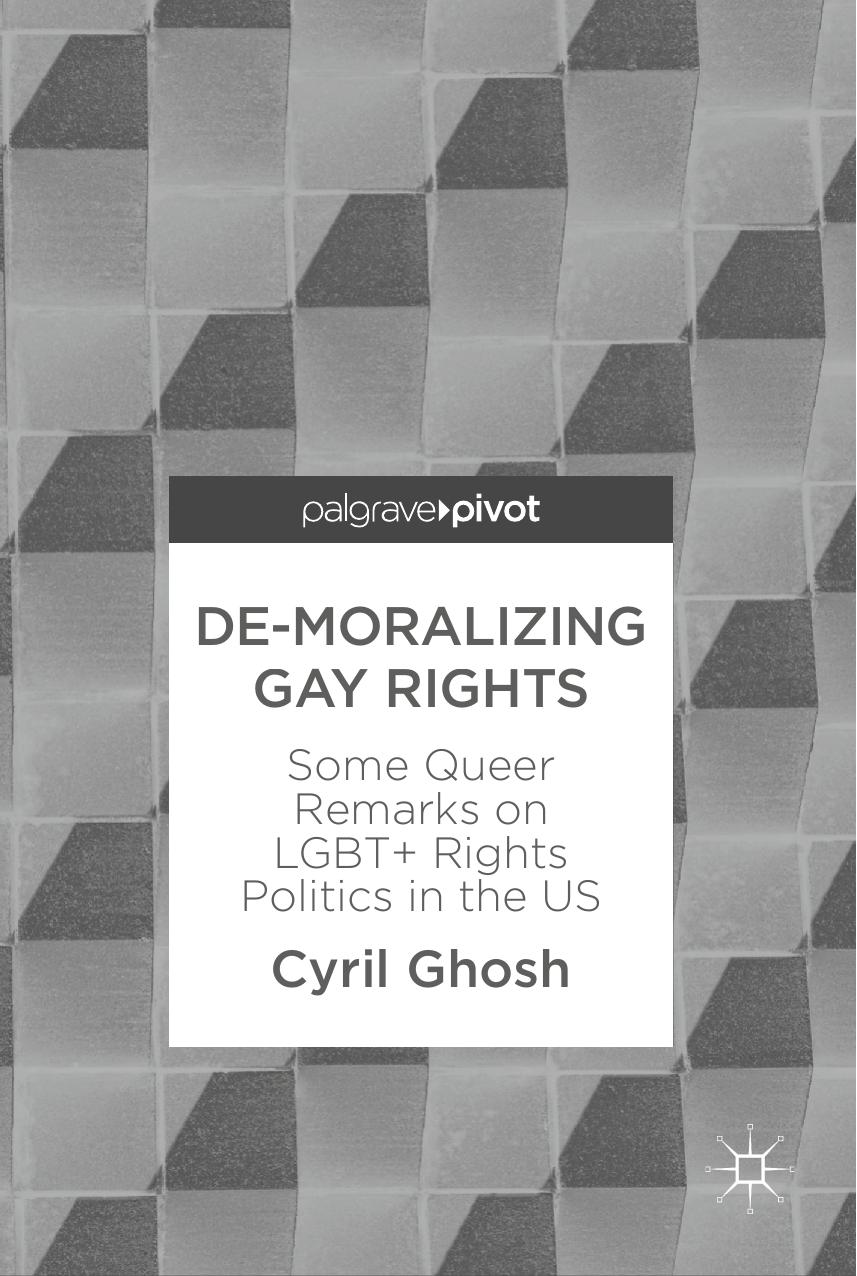De-Moralizing Gay Rights by Cyril Ghosh

Author:Cyril Ghosh
Language: eng
Format: epub, pdf
ISBN: 9783319788401
Publisher: Springer International Publishing
The unsustainability of the claims made here becomes apparent the instant one attempts to evaluate or falsify them. Two controversial suggestions, in particular, stand out. The first is the misguided proposition that if your parents are not married, it would be difficult for you to âunderstand the integrity and closeness of [your] family,â even though unmarried gays and lesbians do, in fact, have the ability to create âloving, supportive families.â One can, of course, assert all sorts of things about abstractions like integrity and closeness of family ties as articles of faith, or arrive at these conclusions on the basis of oneâs personal history or experiences, or even profess them as a âconception of the good,â but these propositions do not admit of any hypothesis-testing, operationalization of variables, evidence-based reasoning, argumentation, or even, surprisingly, logic.
These statements also render as inferior, and less socially respectable, the life choices of those parents who voluntarily elected to never marry, those parents who live apart or who ended their marriages in divorce, and indeed the lives of those children who (invariably involuntarily) grew up in households where their parents were not married and/or living together.
The Court implies that if your parents are divorced or elected to never get married, then they have effectively deprived you of âpermanency and stability.â But permanency and stability in what domains? The citation that follows the phrase is to pages 22â27 of an amicus brief (Smith et al. 2015) which, in turn, explicitly states the following: âThe permanency, consistency, and stability inherent in the parent-child relationship has been recognized by the states as securing childrenâs best interests in the adoption, custody, and visitation contextsâ (Smith et al. 2015, 22, emphasis mine). 16 However, unlike the amicus brief, nothing in Obergefell tells us what, precisely, Justice Kennedy has in mind when he is referring to childrenâs âbest interests.â Is he talking about childrenâs best interests in these specific contextsâof adoption, custody, or visitation? Or is he talking about childrenâs âbest interestsâ per se? Few would dispute the former. But the latter would be a more controversial suggestion.
To be sure, some social scientific studies do suggest that children living in âtwo-biological-parent cohabitingâ families, in certain situations, experience worse âoutcomesâ when measured for âwell-beingâ than those living with âtwo biological married parentsâ (Brown 2004, 351, emphasis mine). These findings, however, say nothing about gay couples. In addition, couples choose to marryâor not, or to separate, or to sometimes get back togetherâfor a range of competing and often interrelated reasons, and childrenâs interests (best or otherwise) constitute only one of them. Therefore, to position the âbest interestsâ of children at the heart of the opinion is to elide the complex set of reasons that animate couplesâ desire to not be married and/or to not cohabit, and to didactically codify the Courtâs disapproval of those who do not look after the unspecified âbest interestsâ of children. Thus, by stipulating a nexus between reproduction/child-rearing and wedlock the Court upholds the dominant cultureâs understanding of family formation and sets it up as a norm to which all ought to aspire.
Download
This site does not store any files on its server. We only index and link to content provided by other sites. Please contact the content providers to delete copyright contents if any and email us, we'll remove relevant links or contents immediately.
My Brother’s Name Is Jessica by John Boyne(997)
Felix Ever After by Kacen Callender(779)
Her Body and Other Parties: Stories by Carmen Maria Machado(759)
Susie Sexpert's Lesbian Sex World by Susie Bright(723)
Always More by Nicole Pyland(528)
Cut & Run by Madeleine Urban & Abigail Roux(513)
A Queer Trade by KJ Charles(510)
Surgeon: A Lesbian Medical Romance (Forest Vale Hospital Book 1) by Emily Hayes(484)
Queering Your Craft by Cassandra Snow(468)
The Picture of Dorian Gray by Oscar Wilde; Camille Cauti(464)
Impatto by John Inman(452)
Lesbian Firsts: 10 Lesbians Share Their First Time With a Woman by Alexandra del Torre(444)
Kathleen and Frank by Christopher Isherwood(440)
The Four Profound Weaves by R. B. Lemberg(436)
Cecilia Tan - The Prince's Boy by Cecilia Tan(434)
Stitching the Soul by Courtney Peppernell(422)
The Interview by Mardria Portuondo(418)
Orientation (Benchmarks) by Kate Canterbary(418)
The Choice by Mardria Portuondo(374)
